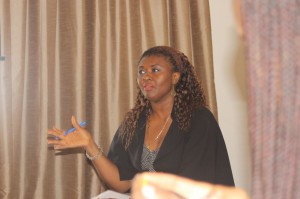Spaces for Change’s Victoria Ohaeri is one of the experts that reviewed Heinrich Boll Stiftung’s latest research study, “Urban Planning Processes in Lagos.” She assessed the legal framework for the establishment of free trade zones and urban mega projects in Lagos State, highlighting the policy and regulatory gaps, including proposals for reform. Heinrich Boll Stiftung is a German International Development Agency and a political foundation of Germany’s Green Party.
Generally, Lagos represents one of the most powerful manifestations of rapid urbanisation and urban growth in Africa. At 17+ million people, the city’s population is growing so fast that censuses can’t keep up. The Heinrich Boll Stiftung Foundation’s latest report pinpointed key laws, policies and regulations and urban planning processes in Lagos, and examined the relationship that exist between the various actors in charge of urban planning. Whether through the establishment of foreign trade and industrial districts – as in the example of the Lekki Free Zones – or the creation of large new town developments like Eko Atlantic City, Lagos continues to witness massive transformative re-planning and restructuring which often “require intense planning and the coordination of capital, technology and political influence.”
Chapter 4 of the report, “Strategic Planning and Urban Mega Projects” identified the social, and economic and environmental effects various mega projects, especially free trade zones in Lagos exert on users and indigenous communities during project conception and implementation. FTZ “initiatives typically lead at times to massive displacement in order to make room for highways, skyscrapers or luxury shopping malls, at the expense of the habitat and livelihoods of the poor.”
In her commentary, Ms. Ohaeri observed that understanding the value added by free trade zones can be derived from answering two key questions: “Who benefits from free trade zones? And secondly, who bears the brunt of free trade zones.” The answers to these two questions are evidently manifest in Lagos State Government’s Development Plan (2012-2015). The five development pillars enunciated in the document place the objectives of economic and infrastructure development far above the social development/human security and sustainable environment objectives. Placing “the Lagos people and the environment” among the least priorities on its development ladder speaks volumes about who the beneficiaries and burden-bearers of urban mega projects in the state are. As a result, there is a constant friction between achieving economic prosperity and the poor’s struggle for survival. Finding that healthy balance between building beautiful, economically prosperous cities, and the preservation of traditional livelihoods is the missing link in most urban mega projects in Lagos State.
The concept of free trade zone is an economic development model that employs generous incentives – such as free land contributions, tax breaks, import and export duty waivers, profits repatriation etc – to attract foreign investment. The incentives that apply in the districts designated as “free trade zones’ do not apply to the rest of the economy. FTZs often entail free land donations, tax breaks, free import and export duties, profits repatriation, cheap labor and so forth. These incentives aim to remove hindrances to trade in the designated FTZs, in order to attract foreign investment to the territory. Lagos Lekki Free Trade Zone (LFZ), established pursuant to the Nigeria Export Processing Zones Authority (NEPZA) Act 63 of 1992, commenced in 2006, with the aim of creating opportunities for the local people and increase the potentials for Lagos and the Nigerian economy. Do FTZ initiatives really do what they promise?
Many problematic issues resulting from the construction and operation of FTZs in Nigeria put question marks on the potential benefits of FTZs to indigenous communities. No meaningful cost-benefit analysis of FTZs has ever been conducted in Nigeria in order to determine the actual value of FTZ incentives vis a vis impact of FTZs on local and national economy. As such, there are no accurate data juxtaposing actual values of FTZ investments on national economy with the value of incentives given? For instance, such an analysis would show how many jobs created minus how many jobs lost?
Lagos State Government acquired over 16, 000 hectares of land, home to twenty-six villages, which formed part of its contributions to the LFZ. The state government, however, only set aside 750 hectares for a resettlement scheme for the entire 26 communities. A cost benefit analysis would look at values of land lost, traditional livelihoods destroyed, and weigh them against the value of foreign investments generated and jobs created in the free trade zones.
Another problem with FTZs is that Nigeria’s resettlement and compensation regimes are obsolete. Compensation for land is governed by Nigeria’s 38 year old Land Use Act of 1978. Because compensation rates for unexhausted improvements on the land have never been reviewed to reflect current economic realities and inflationary impacts on the Naira since the 70S, this has seen indigenous communities being paid peanuts or almost nothing after vast expanses of family and communal lands are taken from them for “economic development” purposes like FTZs.
FTZ “initiatives typically lead at times to massive displacement in order to make room for highways, skyscrapers or luxury shopping malls, at the expense of the habitat and livelihoods of the poor.” Not only that, resettlement and compensation regimes ignore the disparate impact of land takings on specific communities. In this Lekki case, as opposed to partial displacement of some communities, 3 of the affected communities in the coastal areas, namely: Idotun, Okunraiye and Itoke, will be totally displaced from their ancestral homes, farmlands, shrines and source of livelihood because of the siting of a sea port for the LFZ in their abode. The apportioning of the 750 hectares for resettlement took little cognizance of the disparate impact total displacement would have on the 3 affected Lekki communities.





















